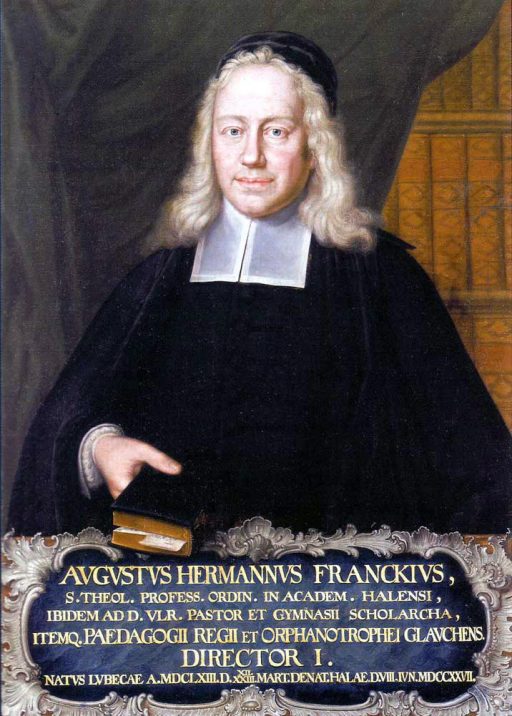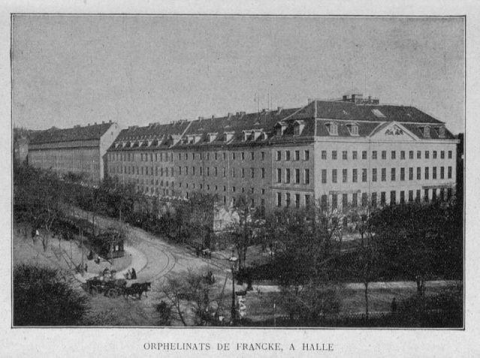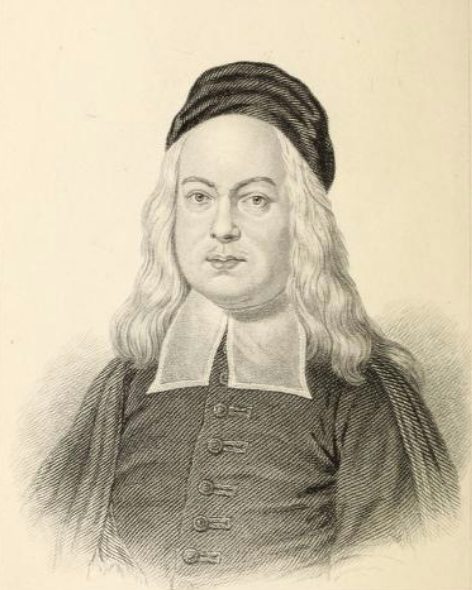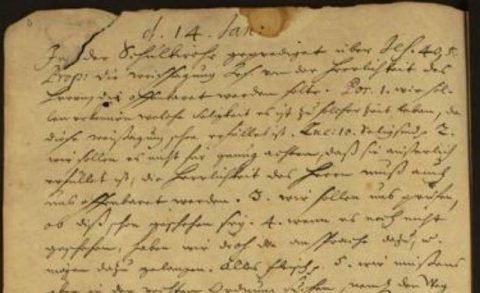August Hermann Francke (1663-1727)
(Pietist Pastor, Professor, Ministry Founder, Spiritual Grandfather of Nicholas Zinzendorf and George Müller)

Overview
August Francke was a German Pastor, Theologian and Professor, who founded a new Pietist university in Halle, as well as establishing a multi-faceted ministry that included an orphanage that would eventually care for as many 2,000 children, a health ministry, a printing ministry, multiple schools, refuge for widows, etc. A key leader in the Pietist movement, he systemized Philipp Spener’s (1635-1705) movement, gave the system expression in the form of definite institutions and provided it with the prestige of a trained theologian. He also brought the organizational ability and persistent faith that enabled his developing a leading-edge ministry. All the while he was being bitterly attacked by many traditional pastors and theologians of Germany.

Why Learn About Francke?
August Francke was an extraordinary man who accomplished extraordinary things for God. Raised in a pietist home, listening to the reading of Johann Arndt's (1555-1621) True Christianity from an early age, Francke adopted and promoted Pietist views, and came to play a key role in the effort. His walk with God, however, was seemingly thwarted for a time prior to his highly instructive conversion. Later he founded a faith-based ministry of unheard of accomplishments that would later play a role in the establishment of Müller's orphanage in Bristol, England.
Francke was led by God to establish his multi-faceted ministry, completely depended on God for financial resources needed, persistently exercised faith through difficult times, and all the while served as a pastor, professor, author of at least one book per year and ministry found/leader.
As a result you can learn about how God spiritually and otherwise prepares a person to do great things for Him, how God leads ministry developments on an incremental basis, the ways to care and provide for the poor and suffering around us, how to face disappointments and setbacks, the role of prayer and persistence in obtaining wisdom and resources, what it means to live by faith, how to organize a large enterprise, the need to establish priorities, the danger of depending on the arm of flesh, the value of time, etc.
Though many books on Francke exist in German, of the few that exist in English, one, Faith's Work Perfected, wonderfully details his little known extraordinary life.
A Defining Moment
"God is able to make all grace abound toward you: that ye always having all sufficiency in all things may abound to every good work." One day as August Francke heard that a friend was in a very needy condition, these words came into his mind. He pondered them, asking whether God could not make him also abound. Nor did he, like many, simply look above him, but also within him and around him. He thought that possibly his hand already held the spade with which he should dig for buried treasures. He set himself down, and, since all the rest of his hours were occupied, robbed himself of his evenings to compose his " Bible Observations" (Observationes Biblicas). He thus earned within a year over one hundred and fifty dollars for his friend. It was Francke's fidelity to duty that made him all that he was to Christendom and to mankind. Each morning he was wont to say to himself that possibly he had passed his last night upon the earth, and as God was granting him the boon of another day, he would spend it as if it were the last gracious gift of God to himself. Such a view of life taught him to be faithful in little things. His life-story, therefore, urges upon every soul the question, How great is thy faithfulness? This interrogation is written upon Francke's career, "Who then is that faithful and wise steward?" It was this event that initiated Francke's life of faith!—Henry MacCracken, Lives of the leaders of the church universal, from Ignatius to the present.
Quotes From August Francke
His Conversion
Francke experienced a life-changing conversion in the course of preparing a sermon. Similar in some ways to the conversion experienced of Charles Finney, God's blessing came in unmistakable ways. (Read about Francke's conversion.)
Francke's Private Life
"The habits of Francke, as must have appeared, from the amount of labour he accomplished, were those of intense exertion. Scarcely any one department in which he laboured, would not be considered by most men as sufficient of itself. He was, in the first place, a pastor of a church: and though after he entered upon the duties of the professorship, he had one or more assistants in these labours, still they were considerable. As a professor, we have seen that he did his full share of labour. As founder of the Orphan House, he was almost constantly engaged in some way or other. How he found time, in the midst of all this, to write a volume a year, besides frequent sermons and tracts, even with the assistance of a secretary, is surprising indeed; and it becomes still more so, when we remember that he received frequent visitors, and had a large correspondence." (Learn more about Francke's personal life.)

Faith the Means of our Happiness
“But, while faith,” he says, “is the ground of our justification, it is also the means of happiness; for righteousness and peace cannot be separated from one another. But when we say that our happiness is secured, it must be remembered that something more is intended, than that we shall hereafter be admitted into heaven. This happiness begins from the moment of our justification. For we are then delivered from the wrath and curse of God, from the power of sin and death. We are brought out of darkness into light, from death unto life. God the Father brings us into the kingdom of his Son, and gives us the pledge of an inheritance, even the spirit of Jesus Christ; renews us in his image, day by day; awakens a holy fear, and love in our hearts, so that we run with alacrity in the way of his commandments, and think it our meat and drink to do his will. Thus does the believer’s happiness commence. He now knows that this heavenly Father loves him, and that he will help him to overcome every adversary to his peace. He is now united to Christ and knows that He is his riches, his glory, his all. He knows that his prayers will be heard through the merits of Christ; and that all needful things will be given him. He has the spirit of God dwelling in his heart, filling him with all knowledge, and enabling him to grow daily in faith and love. He finds happiness, too, in the service of God, is doing good to all men as he has opportunity and in the exercise of true benevolence and compassion. He is, by his union with the Redeemer, changed into the heavenly image, and although he dwells on earth, and mingles in the affairs of men, his conversation is in heaven; and he joins in spirit with its blessed inhabitants in prayer and praise to God. His heart is in heaven, for there he has laid up his treasure; and through the Spirit he holds perpetual intercourse with God. Oh! what blessedness is this thus to be united, in the closest ties, with the adorable Trinity; to have the Great God dwelling in our hearts, and holding his court there; to have angels for our ministers, and to know that as Christ overcame, and is seated on his throne, so shall we triumph over our foes, and sit down with him in the kingdom of Heaven. This blessedness is begun below; but it is completed in that other world, where sin and sorrow can never enter to mar his peace; and where the ransomed sinner shall be conformed to the image of his God, and see his face, and praise him for ever and ever.”
On Meditating on the Scriptures
Nor ought you to be too anxious when you begin your meditations on the Holy Scriptures; for if you join ardent prayers and a holy desire of knowing Christ, to your reading of them, the matter will thereupon grow better, you will unawares be conducted by God himself into the most pleasant and sweet meditation of his eternal truth, and he will, by little and little, discover to you the inexhausted profundities and treasures of wisdom and knowledge, that are hid in Christ Jesus" (Col. ii. 3.)."Religion in youth is almost always a singularity, and he that will maintain it, must dare to be good at the price of being ridiculous."—Quoted by Heinrich Ernst Ferdinand Guericke, Life of August Hermann Francke, p. 231
Christ is the Sum of all Holy Scriptures
"That Christ is the sum and substance of all the Holy Scriptures all do indeed consent; but there are few who understand the meaning of these words; fewer labour much to find out this substance, and know in what manner to make their Inquiry; the fewest of all, are those who advance so far in it, as truly to eat of this Kernel, or Substance, and use it for the nourishment and support of their inward Man. Since therefore this is of all others our greatest concern, it is fit the reader of the Holy Scriptures should in the first place be admonished, not to stick in the rind of their external history, letter, and words; but that he ought to seek Christ himself, as the kernel (or substance) of the Holy Scriptures, and to seek Him in such a manner that he may certainly; find Him, and satisfy his soul with Him."—Guericke, p. 231
On Studying the Scriptures
"Nevertheless the things now spoken, are not to be so understood, as if you were not to read the Holy Scriptures, nor to meditate on what you read. Meditation is of admirable use, being tinged, as it were, with prayer, and exercised by the guidance of the Holy Spirit. By degrees you will learn, howsoever difficult it may seem at first:
1. To attend to the genuine scope of an entire text.
2. To weigh rightly the antecedents and the consequents.
3. To consider distinctly the circumstances, viz. Who? What? Where? By what assistance? Why? How? When?
4. To compare one sentence with another, the Old, with the New Testament, Moses with the prophets and the Psalms, &c. to explain some things by others, the difficult texts by the more easy ones.
5. To receive the words of the men of God, in a divine sense, with which they were imbued, (which they have declared more clearly and fully in some places than in others) not according to their external sound, nor in a carnal sense, as the world is accustomed to do.
6. To collect one truth out of another.
7. To contemplate with pleasure, the sweet harmony and connection of divine truths ; as there is a handle given in what follows to such salutary Meditations.”—Guericke, p. 235
Studying Difficult Passages of Scripture
Nor are you to wonder, if at first, in reading the Holy Scriptures, many things seem to you obscure, and less intelligible, and that it is necessary for you to read the same chapters again and again, before you find any thing that can, in your own opinion, assist you in the knowledge of Christ. Labour not anxiously to understand things that are too difficult for you, but willingly let them pass, until you have your senses more exercised in the divine mysteries. In the meantime you will always discover something that may lead you forwards to the knowledge of Christ. The few things which you find to be easy, you may prudently turn to your own benefit, and may use them to the establishing and strengthening yourself in the love of Christ: thus difficult places will, by degrees, become obvious to you. (Read more from Francke on this subject)
Answers to Prayer
Francke did not ask people for funds, preferring God to impress people to send funds. Here are a few stories about times when he saw God send unsolicited funds.
"Once, when one of my assistants, who acted as paymaster, said to me one evening, 'Our money is all gone;' I answered, 'I am glad of it; for it is a sign that God will send us something again; he has always given me, from my childhood up, a new pair of shoes when the old ones were worn out.' Early the following day, a person was announced, who mentioned that he wished to see me, and delivered me two hundred dollars, which were entrusted to his care for the benefit of the orphan-house.
"Another time, when we were in want, and I bore it in mind whilst perambulating a walk in the garden, on both sides of which lilies were planted, which just then began to expand their flowers, the words of the Saviour occurred to me, which he had spoken against anxious care: 'Behold the lilies how they grow, they toil not, neither do they spin, &c.' I immediately took advantage of these words of our Lord, for further meditation; so that I said in my heart, 'Yea, Lord, I will gladly give thee the glory, and lay aside care, according to thy word; but thou must not leave me in straits, but likewise fulfill thy word and promise; for thou hast said, 'All these things shall be added unto you.' For it easy to say, Behold the lilies! but thy divine power and truth must be honoured in it, that he who obeys thy word, and filially depends upon this thy promise, may also experience its fulfillment.' As I returned from the garden into the house, I found that something had arrived in the interval; and an hour afterwards something additional was sent, by which our present wants were supplied. I was greatly strengthened by this, in believing that the Lord would always keep his promise, as well as incited to trust him more and more, and to cast all care upon him. (Read more stories of answered prayer)
Thoughts on How to Pray
"Show them that it requires no great art and skill to pray acceptably unto God; for they are to speak to him as children to a loving father, they are to spread before him their sorrows and complaints, they are to tell him of the state and condition of their souls, just as they find and feel it; and they need not be at all solicitous about propriety of expression and elegant phrases in their secret prayers; for God regards the sense of the heart, rather than the language of the lips...." (Read more of what Francke said on the subject of prayer)
Thoughts on Preaching
"It would further be useful, and it is highly necessary, that ministers should not only preach up the necessity of conversion, and instruct their hearers to depend on the grace of Christ for it, but also that they should, very frequently, in their sermons explain the nature and the whole progress of conversion, sometimes more largely and distinctly, and at other times more briefly, endeavoring thereby to lead their hearers into a true knowledge of the state of their souls; and showing them how they must repent of their sins, what they must do to be saved from their natural misery and ruin, and, in short, how they may obtain the full salvation of the gospel; that so every one may be able to give an answer to that most important question, 'What must I do that I may be a child of God and inherit eternal life?'" (Read more on preaching)
Francke: Educational Pioneer
Francke was able to establish a wonderful work, as attested to in the following: ""At the death of Francke in the year 1727, the following report of the Institutions was sent to King Frederick William I.: (1) In the Pedagogism, 82 scholars, 70 teachers and other persons; (2) in the Latin school, 3 inspectors, 32 teachers, 400 pupils, and 10 servants; (3) in the common school, 4 inspectors, 98 male teachers, 8 female teachers, 1725 boys and girls; (4) orphans, 100 boys, 34 girls, 10 overseers; (5) at the free table, 225 students, 360 poor children ; (6) employed in the drug store, bookstore, etc., and other persons in the establishment, 82."1 This makes a total of over 3200 persons instructed, sheltered, employed, or otherwise connected with these great Institutions." (Read more about Francke's educational endeavors.)
On God's Mercy
Here are a few paragraphs on how God responds to our faith with His mercy.
Rules for Conduct
"Do not speak much. When it is necessary to say any thing, do it respectfully, advisedly, and kindly. Always speak with earnestness, with clearness, and deliberation.

Books
Books By and About August Hermann Francke
Faith's Work Perfected
This priceless biography shares how Francke developed full-fledged ministry on the basis of prayer alone. If you are wanting to live by faith and develop a ministry by faith, this is the book for you! (Read Faith's Work Perfected online.)
Download a pdf of Faith's Work Perfected for your tablet.
Francke's Memoires
"In this state of anguish I knelt down again and again, and prayed earnestly to that God and Saviour in whom I had, as yet, no faith, that if He indeed existed, he would deliver me from my misery. At last he heard me! He was pleased, in his wondrous lovoe, to manifest himself, and that, not in taking away, by degrees, my doubts and fears, but at once and as if to overpower all my objections to his power and his faithfulness. All my doubts disappeared at once, and I was assured of his favour. I could not only call him God, but my Father. All my distress was dispelled, and I was, as it were, inundated wth a flood of joy, so that I could do nothing but praise and bless the Lord. I had bowed before Him in the deepest misery, but I arose with indescribably peace and joy." (This memoire was written for the American Tract Society and was published around 1830. Read his Memoire)
Guerike: Life of Augustus Herman Franke
This book was translated from German by Samuel Jackson and is excellent.
Christ the Sum and Secret of the Holy Scriptures
This book was translated from German.
Nicodemus
Research

The Research Libraries and Facilities of the Francke Foundation in Halle
You will find a great deal of information on Francke, the orphanage, Pietism and many other subjects at this link.